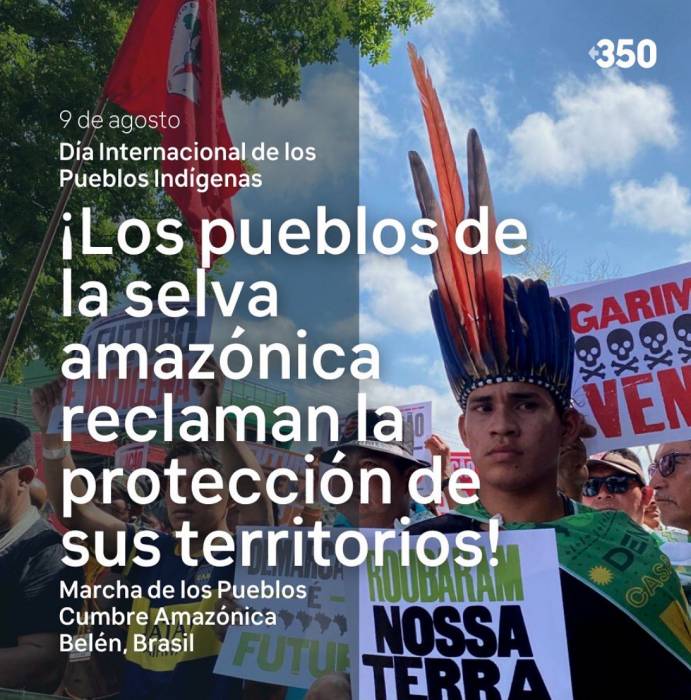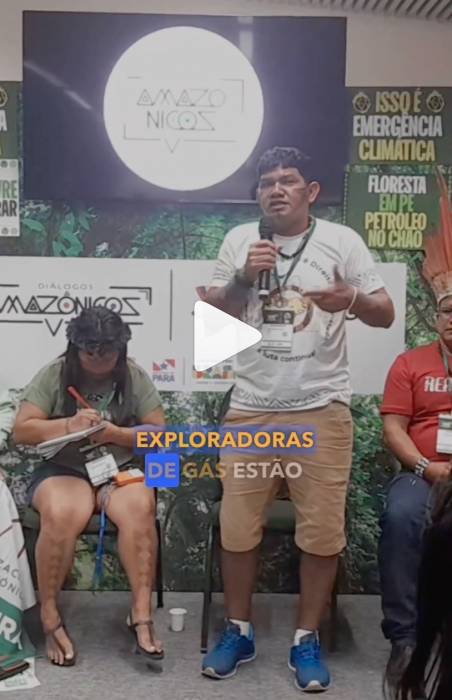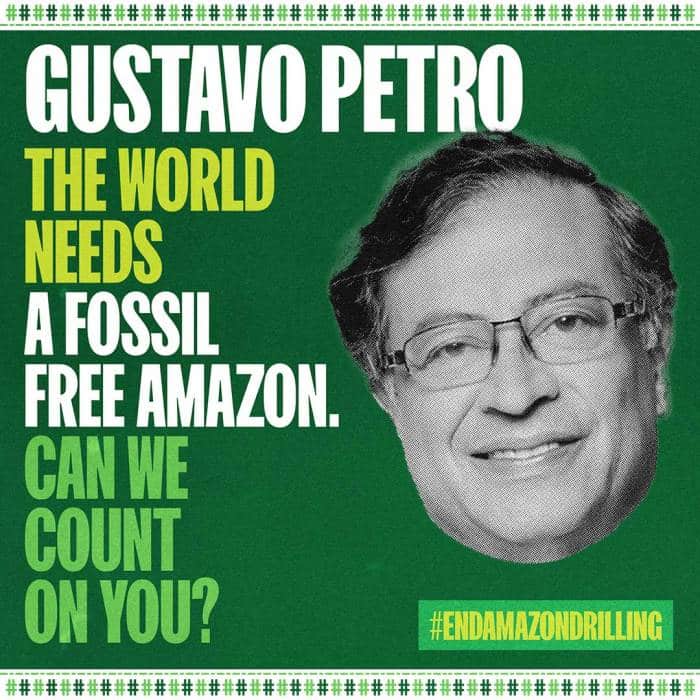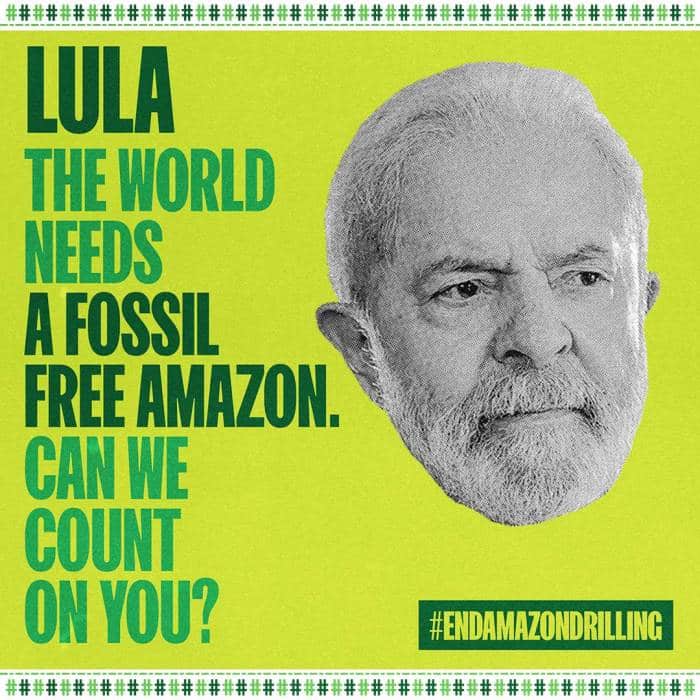
Indigenous and climate activists marching in Belém, Brazil during the Amazon Summit. Photo by: @nayjinknss @anamendes_anamendes
All of this happened at the Amazon Summit, a meeting of presidents from eight South American countries, held in Belém, Brazil, on Aug 8-9. Organized by 🇧🇷, it had the objective of defining joint commitments to expand the protection of the Amazon forest.

Instagram card about the march held in Belém, Brazil during the Amazon Summit. Check out more photos and videos: https://www.instagram.com/p/Cvvaj5OvwCK/?img_index=2
🤝 These countries also wanted to show regional unity in the protection of the climate, in order to get stronger for the negotiations at COP28, the biggest global meeting of heads of state for the climate, to be held in Dubai, in December.
👯 This diplomatic dance matters, even if you do not live in the region, because the world’s largest rainforest is key for the climate. Its trees act as a gigantic carbon reservoir. But, when a tree is cut down or burned, it releases its carbon, exacerbating the climate crisis.
☠️ Activities such as illegal cattle ranching and mining have caused the deforestation of around 20% of the Amazon. In addition, at some points, the negligence of oil and gas companies has also caused the contamination of huge areas of rivers and forests.
https://gijn.org/2022/09/12/investigating-oil-spills-and-corporate-impunity-in-the-amazon/
The climate crisis, caused by the burning of oil, gas and coal, also threatens this global treasure. How? The changes in temperature and rainfall patterns can transform the forest into a savanna in the long term. If this happens, it may be irreversible.
👀 The IPCC has already warned that if the savannization of the Amazon occurs, it could aggravate the climate crisis on a global scale. For indigenous peoples in the Amazon, it would be even more disastrous, as it would severely damage their way of life.
For all this, Indigenous Peoples, who are the greatest guardians of the forest and on the front line of the climate crisis, went to the Amazon Summit to demand climate action from governments. The climate movement was there too, including 350.org‘s campaigners!

Frame of a video of the speech of the Indigenous leader Jonas Mura, from the Mura people from Brazil, speaking at an event held in Belém, Brazil by 350.org and its partners. See the video here: https://www.instagram.com/p/CvuRFJ8OppO/
🗨️ Through a lot of dialogue, Indigenous Peoples and climate activists reached very concrete requests. 350.org, for example, organized an event on the impacts of fossil fuels in the Amazon, along with Global Gas and Oil Network (GGON), Climainfo (Brazil), MOCCIC (Peru), and other partners.
✊ ¡De los pueblos indígenas de la Amazonía vienen soluciones fundamentales para salvar la selva tropical más grande del planeta!
🎥 Este video fue hecho hace pocos minutos, en el taller para conexiones entre pueblos que luchan por una #AmazoníaLibreDePetróleo – y de gas fósil. pic.twitter.com/Y8WOjfWB5a
— 350 América Latina (@350AmLatina) August 6, 2023
Important common requests from the climate orgs:
➡️ Amazonian countries need to act urgently to avoid the point of no return.
➡️ The rich countries, historically responsible for the climate crisis, must drastically cut their emissions, to avoid the savannization of the Amazon.
➡️ To achieve these goals, the Amazonian countries must set the goal of ending deforestation within a tangible horizon – several mentions of 2030 were made.
➡️ It is also essential to ban the extraction of oil and gas in the Amazon.

Banner designed by Climainfo and used at the mobilizations of the Amazon Summit.
📃 At the end of the Summit, it became clear that the popular movement’s expectations would be met just in part. Brazil and Colombia stood out because they worked to include a commitment in the final document, that of preventing the Amazon from reaching the point of no return.
But 🇧🇷 and 🇨🇴 disagreed on the issue of fossil fuels. Colombian President, Gustavo Petro, made public announcements that countries should include the oil and gas ban in the final document. Brazil, led by President Lula, was not in favour of adding this item to the text.
In the end, the commitment to an Oil and Gas-Free Amazon did not make it to the Summit declaration, to the great disappointment of the people’s movement. The press around the world highlighted the lack of action by countries in this regard.
❌ It got ugly for Brazil, especially because President Lula has been trying to stand out as a global leader for the climate. His government has been delivering important progress in the protection of the Amazon, but in this case, they stood on the wrong side, that of polluters.


The Summit’s declaration did have positive sides, too. The main one: the commitment to acting to avoid the point of no return has entered the final text! Other highlights: the recognition of the importance of fighting climate racism and the improvement of cooperation to monitor illegal activities.
But for such a promising summit, the result could have been better!
We still need clearer targets for ending deforestation. And we definitely need to protect the region from the damage caused by oil and gas extraction! 🌴 In short: forest standing, oil and gas on the ground!
Well, what now? The next great opportunity for countries in the region to show progress in the protection of the Amazon will be COP28.
Check what 350’s Latin America director, Ilan Zugman, said about the future perspectives for the Amazonian countries. 👇
“If, by COP28, these countries use the foundation built at the Summit to assume more ambitious commitments, individually and as a bloc, they will have a much greater capacity to put pressure on rich countries to resolve the climate chaos, created by these very same rich countries”.
🛡️ Protecting the Amazon from the oil and gas industry is, therefore, an opportunity for Brazil, Colombia and other South American countries to strengthen their voices and global leadership role in the climate negotiations.
For everyone fighting for the planet, the legacies of this summit were:
➡️ The beautiful mobilization led by the people
➡️ Wins such as a commitment from the governments to avoid the point of no return
➡️ The certainty that we can – and will – continue to demand climate action!
To learn more about how 350.org is helping to build an ⭐️ Oil and Gas-Free Amazon ⭐️, check out this opinion piece signed by 350’s Ilan Zugman. It was published in English by the Brazilian news website PlenaMata. 🧐
###